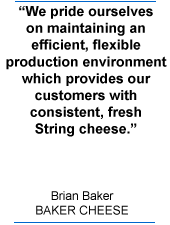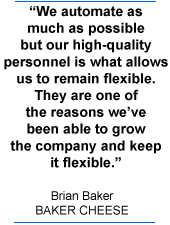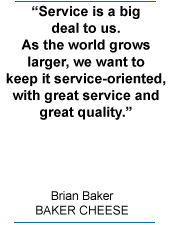 |
|||


|
 |


|
|

October 10, 2008 |
|||
| Flexibility helps Baker Cheese meet the needs of String cheese customers | |||
By Kate Sander ST. CLOUD, Wis. — String cheese is one of those products that’s a lot of fun. Kids play with it. Adults and kids alike snack on it. (Reportedly, adults play with it, too.) There was even a band formed in the late 1990s — The String Cheese Incident — that invoked its name. At Baker Cheese that fun is everyday business, a business into which now four generations of the Baker family have poured their time and energy. “If you love String Cheese you have come to the right place. We are the String Cheese Specialists,” the company proclaims on its website. Baker Cheese is a family-owned String cheese manufacturer based in the small Wisconsin town of St. Cloud. The company’s String cheese is marketed in the Upper Midwest under the Baker Cheese label as well as around the country under many different private labels. The company has the capability to package its String cheese in a wide range of package sizes, says Brian Baker, a fourth generation Baker who serves as company vice president handling sales. The company makes String cheese sticks including 0.750-ounce, 0.833-ounce and 1-ounce sizes, and it can package them individually and place them in packages up to several pounds. “We make every package size — 4,6, 8, 9, 10, 12, 16, 18, 20, 24, 30, 36 (ounces) and One thing that makes the company unique is its sole focus on String. Founded in 1916 by Frank Baker when he purchased a small Cheddar plant, the company was converted to a full Mozzarella plant in 1957 by Frank and his son Francis. As Mozzarella grew in popularity, the third generation of the Baker family joined the business and the company began to focus on retail sizes of Mozzarella. By the mid-1970s, the Bakers began experimenting with a new product called String cheese, a Mozzarella that had some creative properties that allowed the cheese to “string” if it was prepared properly. The Bakers began creating innovative ways to produce this snack, mixing it, molding it and cutting ropes of it into little sticks for friends, family and, soon, customers. In the beginning, 1- and 5-pound packages of bulk String were the most popular way to sell the cheese. But with a growing desire among consumers for portion control and the advent of individually-wrapped String, the company began to experience tremendous growth. By the mid-1990s, a large percentage of Baker Cheese’s business was in String cheese, and a plant expansion in the late 1990s allowed the company to produce increasingly larger amounts. In the early part of this decade, Baker Cheese switched its production to solely that of String cheese to focus exclusively on the high-demand product. The switch to all String cheese production occurred just in time for the national Atkins Diet craze, which peaked in 2002 and 2003 and helped drive the company’s growth, Baker notes. The Atkins Diet, which eschews carbs and promotes the consumption of protein — including cheese — turned many consumers onto cheese as a snack. The convenience and portability of String cheese was a perfect fit, and sales at Baker Cheese grew significantly. And even as many consumers returned to more traditional diets, the company has continued to enjoy growth in part because the diet plan turned people onto String cheese and they have kept it a part of their regular diets, Baker says. The company may only be a medium-sized company by industry standards, but because more than 95 percent of Baker Cheese’s business consists of individually-wrapped cheese sticks, there are a lot of packages of cheese leaving the plant. While the company doesn’t disclose production and sales data, Baker says the company regularly converts more than a million pounds of milk a day into cheese — and that translates into over 1.5 million sticks of cheese.
“It’s a very streamlined operation,” says Baker, noting that the cheese is shipped out of the plant within 48 hours of it being made. The company’s size and status as a family-owned business give it flexibility to work with a wide range of customers, Baker says. “We pride ourselves on maintaining an efficient, flexible production environment which provides our customers with consistent, fresh String cheese,” he says. “We have a unique balance within our company to be flexible enough to fulfill the needs of every customer size from a small local distributor to large, nationally recognized brands.” Most of the company’s business is private label and national brands, with the Baker Cheese brand, primarily sold in Wisconsin, a relatively small part of the business. While not short-changing its own Baker brand, the company focuses most of its energy on its private and national label customers. There is brand recognition with the Baker brand among consumers, but the company works to achieve brand recognition with its direct cheese customers, too. “The brand recognition we work on is within the cheese industry. We want to work with other companies to help them with their private label or national brand,” Baker says. “We don’t have a lot of direct feedback from consumers except for the Baker brand, but we rely on input from our customers and we continually rate very high,” he adds. “We have a good grasp on our customers and consumers and what they’re looking for. They can have confidence that they are going to get a high-quality, consistent finished product.” Quality and consistency are apparent on the contest circuit as well. Last year, the The company holds all of the packaging material for its customers, and Baker admits that between inventory management and making so many packages of cheese, String cheese production can be fairly labor intensive. “We automate as much as possible,” he says, “but our high-quality personnel is what allows us to remain flexible. They are one of the reasons we’ve been able to grow the company and keep it flexible.” More than one-third of the company’s cheesemaking production personnel are licensed cheesemakers who have been with the company for 10-plus years and know the String cheese trade inside and out. The company’s head cheesemaker is a Baker family member, and all told there currently are six members of the Baker family involved in the business. Brian Baker’s father, Dick, is president and CEO. Also in management are Dick’s brother Jack Baker and four members of the fourth generation, Brian Baker and his brothers Mark, Jeff and Kevin. “Service is a big deal to us,” Brian Baker says of the company. “As the world grows larger, we want to keep it service-oriented, with great service and great quality.” The company’s management also likes to give its customers options. In addition to the array of sizes Baker Cheese offers, the company offers light/reduced-fat String cheese, a category that has experienced significant growth over the past three years, Baker says. “String cheese, which is low-moisture, part-skim Mozzarella, is healthy to begin with, but there are segments of consumers still looking for less fat per serving,” he says. The company also offers a small amount of smoked String cheese under its brand name and a larger but still limited amount of organic String under private label. Both products are a bit more challenging to produce — smoked String has to be batch brined and is unwieldy to make in large amounts and both products involve segregation from other products and ingredients. Organic String also involves additional certification. However, to meet the needs of customers, the company produces both. “Our overall business philosophy is that if we see a demand, we will try to find a way to stay flexible enough to meet it. That flexibility is a big benefit to our customers,” Baker says. CMN
|
|||
| CMN article search |
|
|
© 2025 Cheese Market News • Quarne Publishing, LLC • Legal Information • Online Privacy Policy • Terms and Conditions
Cheese Market News • Business/Advertising Office: P.O. Box 628254 • Middleton, WI 53562 • 608/831-6002
Cheese Market News • Editorial Office: 5315 Wall Street, Suite 100 • Madison, WI 53718 • 608/288-9090


 larger,” Baker says.
larger,” Baker says. Baker Cheese is a 100 percent turnkey operation, acquiring milk from local Wisconsin dairy farms and making cheese and packaging it as customers order it.
Baker Cheese is a 100 percent turnkey operation, acquiring milk from local Wisconsin dairy farms and making cheese and packaging it as customers order it. company’s awards for its cheese included a second and third place in the String cheese class at the 2007 Wisconsin State Fair and, notably, a Best of Class award in the U.S. Championship Cheese Contest’s String cheese class.
company’s awards for its cheese included a second and third place in the String cheese class at the 2007 Wisconsin State Fair and, notably, a Best of Class award in the U.S. Championship Cheese Contest’s String cheese class.